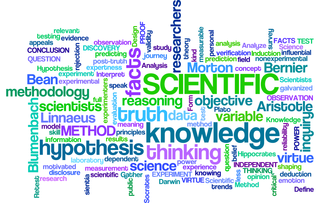Cognition
The Virtues of Science-Based Thinking in the Post-Truth Age
Oxford dictionaries selected “post-truth” as the 2016 word of the year.
Posted August 17, 2017

I have observed some worrisome trends that have motivated me to speak out on the virtues of science based thinking, and to write a textbook on The Science of Diversity.
Oxford Dictionaries selected “post-truth” as 2016's international word of the year. (“‘Post-truth’ named 2016 word of the year by Oxford Dictionaries”) The “post-” prefix means the notion of truth is now irrelevant.
The dictionary defines “post-truth” as “relating to or denoting circumstances in which objective facts are less influential in shaping public opinion than appeals to emotion and personal belief.” https://www.washingtonpost.com/news/the-fix/wp/2016/11/16/post-truth-named-2016-word-of-the-year-by-oxford-dictionaries/
Scientists have been galvanized by this post-truth rejection of the importance of truth, science, and objective facts.
The word “science” traces back to the old French word science meaning “knowledge” or “understanding” or “knowledge derived from experience, study, or acquired skill” and to the Latin word scientia meaning "knowledge” or “a knowing expertness” and in later use to “knowledge, as opposed to belief or opinion.”
The origins of the word suggest that from the very beginning science was viewed as a method or mode of thinking — about any subject — in which the thinker acquires knowledge by improving his or her thinking by skillfully and deliberately taking charge of the constructions inherent in thinking and imposing intellectual standards upon them.
There are many ways of doing science. Scientists who do science include laboratory experimenters, survey researchers, field researchers of both the experimental and nonexperimental kind. Whatever their method of inquiry, all attempt to do science in the pursuit of truth.
The pursuit of scientific truth is not an automated process, but a very human, and thus subjective as well as objective process. This assertion is not a negative declaration for objective facts lost to the difficulty of human limitations. In highlighting the subjective aspects of scientific thinking, I do not align myself with the relativistic view that truth is a meaningless idea outside cultural assumptions and that science can therefore provide no objective facts or lasting answers.
As a McGill, Harvard, and University of Pennsylvania trained scientist, I share the stance of my colleagues: I think that a factual reality exists and that science, by trial and error, can learn about it.
The earth really does revolve around the sun. Galileo Galilei was arrested for his discovery, but eventually the truth behind this factual reality had to be recognized. In terms of the study of diversity, the eye really does draw distinctions, evaluates differences, and prefers what is familiar.
What makes scientific thinking different from everyday thinking is that it is self-corrective based on data, evidence, and information. For example, Darwin’s view of what race was and how it originated in the human species was based on a copious set of data.
These data allowed him to establish monogenism as the dominant paradigm for racial origin, and to invalidate the views on hierarchal racial differences of his predecessors including the Greek philosophers Hippocrates, Socrates, Plato, Aristotle and scientists such as Bernier, Linnaeus, Blumenbach, Morton, and Bean. Scientific thinking led Darwin to conclude that for any two species if we search back far enough, we would find that all are descended from a common ancestor.
Though, Darwin’s evolutionary theory did not put an end to the scientific idea of a hierarchical natural classification system that supposedly reflected inborn differences and measures of value between people, it helped pave the way to the current Gates Foundation motto: “All lives have equal value.”
The scientist’s quest is never done. Scientific truth remains always tentative and refutable; subject to possible disconfirmation. "The limitations of scientific thinking do not eliminate the chance to do good research." (“Embrace logic to improve both education and society - Harvard Gazette”) Instead, it makes us mindful of the errors in research — and the limitations of all human understanding.
An important takeaway to consider is that all scientific investigations are subject to error. It is better to be aware of this, to study the causes and assess the importance of the errors rather than to be unaware of the errors concealed in the data and in the mind of the scientist.
Science and what we call “critical thinking” take discipline and diligence. Thinking like a scientist keeps us constantly open to new ideas and questions before we believe. The scientific method encourages us to change our minds when the data suggest doing so. And it encourages us to be persistent and study it again.
This way of scientifically looking at the world soon becomes second nature. Even everyday events and our relationships become revelatory experiments. When the results are not what we expected, we are pressed to find out why and to figure out a better approach. Thinking like a scientist is a lifelong journey.
Also, there is a feature of scientific investigation that is often not talked about explicitly. We might term this feature scientific integrity or honesty and we just hope that students will catch on by example.
When we are conducting an experiment, we are expected to report everything that we think might make it invalid and unreliable, not just what we think is right about it. Cherry-picking or the fallacy of incomplete evidence is contrary to scientific investigations. Rather, we are expected to give alternative interpretations of the data; specific details that could cast doubt on our interpretations must be given; we are expected to report anything that is wrong, or possibly wrong with our conclusions.
Our intent is to try to give all the facts and information to help others evaluate the value of our research; not simply the information that persuades judgment in one specific way. We have learned that the truth will ultimately come out when other scientists repeat our experiment. So, we are encouraged to examine our own biases and to be honest with ourselves.
When I talk reverently about scientific thinking, I am extolling the virtues of a way of thinking that involves honestly gathering and testing as much information as possible and seeking ways to use it for the greater good of all humanity.
Copyright © Mona Sue Weissmark All Rights Reserved
References
Weissmark,M. (forthcoming). The Science of Diversity. Oxford University Press, USA.
Weissmark, M. (2004). Justice Matters:Legacies of the Holocaust and World War II. Oxford University Press, USA.
Weissmark, M. & Giacomo, D. (1998). Doing Psychotherapy Effectively. University of Chicago Press, USA.




